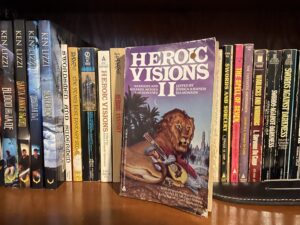
I have previously reviewed the first volume of Heroic Visions. (At least, I’m pretty sure I reviewed it. The mysterious disappearance of the majority of my posts a couple years back, and the slow resurrection of them, copied from a repository at Goodreads, have led to some number falling through the cracks.) The point is, it wasn’t a rave review. So I have only myself to blame for picking up the second. But I had my reasons. [UPDATE: Here is the review, found on Goodreads.]
Heroic Visions II was published in 1986, edited by Jessica Amanda Salmonson. I will refrain (mostly) from commenting on Salmonson’s introduction or author intros. Perhaps her tenor strokes you positively, but she rubs this cat the wrong way. Let’s get right to the stories, then.
The Inn at the World’s End. Keith Roberts. Fantastically evocative title, bringing to mind Douglas Adams and Neil Gaiman, both countrymen of Roberts. Roberts writes a tale that some alternate universe Lord Dunsany or Clark Ashton Smith would write about a Solomon Kane variant, though this must be an alternate universe in which readers enjoy stories in which nothing happens until the very end, and that happening itself is murky, confusing, and lacking explanation. While I admired the language and the craft, I didn’t care for the tale itself.
Voices. Michael Bisop. Here we have a complete tale. True, it is more a fairy tale than a Heroic Vision, yet it is an entertaining story. The mythic China analog is well drawn. There is a current of droll humor that conveys the reader through the narrative and hustles him past the more outré parts that might otherwise jostle the reader from his suspension of disbelief. Worth the read.
Lazarus. Ellen Kushner. Experimental fiction. Not all experiments succeed.
La Strega. Richard A. Russo. Historical fantasy set in a middle ages Sicily. A decent enough story, if a trifle Freudian. It is at this point in the anthology that I’m forced to accept that my vision of the heroic and that of the editrix do not align.
Honor. Jody Scott. No comment. I’m beginning to lose hope. The content page assures me that the anthology boasts entries by both Manly Wade Wellman and Avram Davidson. Why to lead in with one of those two masters? Anyway, next up is one from the editrix herself. Oh boy. Open mind, Ken, open mind.
The Lingering Minstrel. Jessica Amanda Salmonson. Well, I’ll be a monkey’s uncle. This is a solid, entertaining yarn, competently written. It’s a sort of Elizabethan weird tale. I enjoyed it. It seems JAS is better at writing stories than at selecting them. Given, however, that this anthology includes the aforementioned Manly Wade Wellman and Avram Davidson, I’m eating my words even as I write them. Speaking of Avram Davidson:
The Head of Shemesh the Eshurian. Avram Davidson. This story (novella?) is itself worth the price of the book. I’ve waited decades for a follow up to Caravan to Illiel, from Flashing Swords #3. Had I known it was in this volume earlier…Well, Head is classic Avram Davidson: part travelogue of a brilliantly imagined, original world, a bit of a picaresque, and touched with the drollery of a Fafhrd and Gray Mouser story. Speaking of the twain, Cartha Cabira is a fully realized and enticing a city as Lankhmar. As a writer, Davidson never follows the beaten path. His narrative zigs, meanders, u-turns, and takes to the air at the least expected times. Enthralling stuff.
The Lion of Elirhom’s Anger. Michael Nicholas Richard. This is, presumably, the cover story. For what is purportedly Richard’s second story, Lion is a confidently written, generally competent work. For me, however, it suffers from a somewhat heavy-handed thematic preachiness. And there seemed to be a couple of pieces missing from the puzzle, such that I almost felt the need to go back through and see if I’d missed some foreshadowing or cleverly hidden data dumps. Perhaps that’s why the cover story didn’t lead off the anthology. Still, good job.
Eammon’s Banshee. Gillian FitzGerald. Political fiction. No comment.
The Slaughter of the Gods. Many Wade Wellman. JAS’s introductory commentary is particularly egregious here, at least to pulp S&S aficionados. That’s all I have to say about that. Moving on to Wellman: Kardios! I am a happy man. Where Avram Davidson is a lush, Renaissance painter, Wellman is a gifted illustrator; with just a few deft economical pen strokes, he drafts as enticing and fantastic a world as Davidson does with brush and polychromatic pallet. Slaughter serves as a sort of epilog to the Kardios stories. Short, emblematic, fun, and appropriate. Farewell Kardios. Happy trails.
Cohen the Clam-Killer. Steven Bryan Bieler. Probably amusing if read aloud.
The Word-Woman of Dza. Grania Davis. A story in search of a point. Again, not my idea of a Heroic Vision.
Masquerade of a Dead Sword. Thomas Ligotti. We end on a strong, though perhaps sour, note. Ligotti offers us an intriguing, horrific phantasmagoria. If Edgar Allan Poe had tried his hand at sword-and-sorcery it might have emerged like this tale of madness and despair.
And despair is mostly what I feel looking back at this misnamed anthology. Worth it though for the gold among the dross.
Speaking of gold (or dross), you might like to mine through some of my works. Give Under Strange Suns a try, for instance.
Now, on we go with the doings of Magnus Stoneslayer.
SAVAGE JOURNAL
ENTRY 42.
I hear some men claim to be skeptical of coincidence, dear diary, as if all the world’s inhabitants were scheming masterminds and that any given encounter was thus not a matter of chance but of cold calculation. This is utter rot of course. Most men are too dense to plot lunch, let alone a complex sequence of seemingly random events leading to some prearranged end. The world is a vast place, filed with mischance and people meeting haphazardly like pebbles in an avalanche. Given this, I was bound to unexpectedly run into someone I knew eventually. Skeptics can scoff at coincidence all they like, but their disbelief in no way dismisses its reality.
I was explaining this to Yaslina, whom I’d bumped into yesterday on speck of an island in the Zajsan Sea (along with her ever present companion, Vetrius the wizard) when she informed me that, as a matter of fact, she’d been looking for me.
Have I mentioned that I find this woman infuriating?
It seems certain elements of the Zantian Empire deem her continued existence inconvenient. She’s a hunted woman, though not officially so; the internal dissensions of the Empire are labyrinthine. In the course of her flight she reached the northern shore of the inland sea. There she heard rumor of a new corsair harrying the sea lanes, a red-handed pirate with the barbaric name of Magnus. She figured that must be me. I’d been of some slight service (so she dismissively termed my heroic battle to save her life) in the past, and as captain of a pirate ship I was perhaps in a position to aid her again.
Her unruffled certainty that I’d fall in line and assist her irks me dear diary. Her half smile – a quirk of her full lips, like a young rose unfurling the petals of a lone section of the bud – betokens placid self-assurance. She prattles on, outlining plans for me and my crew as if my agreement was a foregone conclusion. Irksome. But what is truly maddening is that she is correct; I will take her aboard, I will help.
I should let my crew, my villainous band of seaborne cutthroats, have their way with her and then turn her over to the Empire for a reward. I should treat her with disdain, return her ingratitude with pirate’s scorn.
But I won’t. I believe in coincidence. I believe also in the connivance of scheming Zantian noblewomen. But what a barbarian believes bone deep, dear diary, is in fate.
So tomorrow my ship takes on supercargo. Until then, I remain faithfully,
Magnus Stoneslayer

2 comments
Salmonson consistently wrote at best adverserial introductions to the anthologies she edited as if to bait the audience. The title “Heroic Visions” was a bait & switch. I ended up buying both volumes due to one story: the Leiber story in the first and the Wellman story in the second.
That’s my general impression. At least we got a few decent stories.